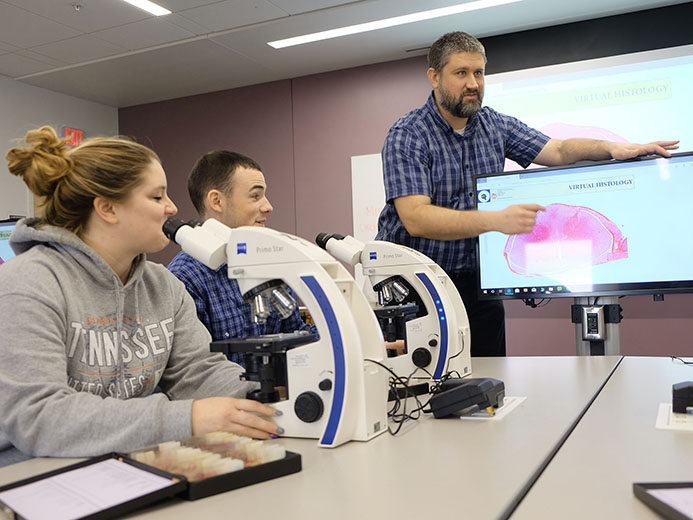College of Veterinary Medicine launches one-year master's degree program in biomedical science
Friday, Feb. 28, 2020

Matthew Basel, clinical assistant professor, points out cellular structures to veterinary students in the Microanatomy Laboratory at Kansas State University. Basel says this lab will be one of several world-class facilities available to students in the college's new one-year master's in biomedical science program. | Download this photo.
MANHATTAN — Students interested in professional health careers now have an option to earn a master's degree that can be completed in one calendar year. The College of Veterinary Medicine at Kansas State University has announced the launch of a new one-year master's degree in biomedical science.
This three-semester program is the first of its kind in Kansas and is specifically designed to bridge the gap between undergraduate and postgraduate studies.
"Often students are not sure what their future holds," said Matthew Basel, clinical assistant professor and associate director of the program. “The pre-professional one-year master's program is designed to introduce students to the biomedical field and prepare them for professional school. During the program, students will take advanced courses in a wide range of biomedical sciences, including anatomy, physiology, histology and pharmacology."
The program will be featured at the All-University Open House Saturday, April 18, on the Manhattan campus. Drop by 308 Trotter Hall and meet with faculty from the program.
Hosted in the anatomy and physiology department, the pre-professional one-year master's program in biomedical science is a non-thesis, coursework-based master's degree that can be completed in 12 months. Typically a master's degree program takes about two years to complete. This program starts during the summer session and is completed at the end of the following spring semester.
All students earning a master's degree at Kansas State University must complete a "culminating experience" that will be determined by the student in concert with his or her graduate committee. Culminating experiences include either an intellectually creative project, a final report or a culminating examination.
"We believe the best place to prepare for professional school is at a professional school where students can interact with professors who understand the program," Basel said. "Students will take courses designed to have the same rigor as any other professional health school and have access to world-class facilities. Students will start in the summer semester with an intensive introduction to anatomy and physiology, followed by courses in the fall and spring."
Along with Basel, course coordinators include Pradeep Malreddy and Cathy K. Sparks, who both teach anatomy courses in the veterinary college.
"There are no specific admission requirements for this program, as we would like to serve a wide range of potential students," Malreddy said. "We do have some suggested guidelines for students that we think will help them be more likely to succeed. We recommend a bachelor's degree in a biomedical science-related field, a minimum 2.5 or higher overall grade point average and at least a 2.8 grade point average in their higher-level science courses or the last 45 hours of bachelor's degree studies."
For a full description of the program, the admission requirements and application procedures, go to vet.k-state.edu/education/graduate/one-year-masters/admissions.html.
Classes for the one year master's program are scheduled to start on June 8. Application is made through the Graduate school at Kansas State University, while the one-year master's program in biomedical science is administered through the College of Veterinary Medicine.
